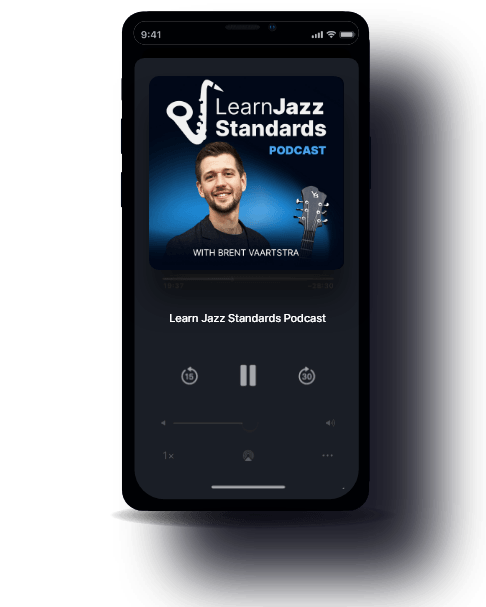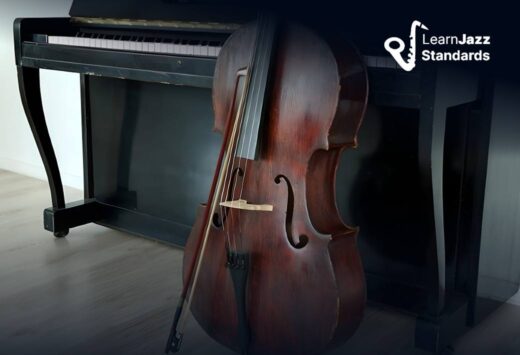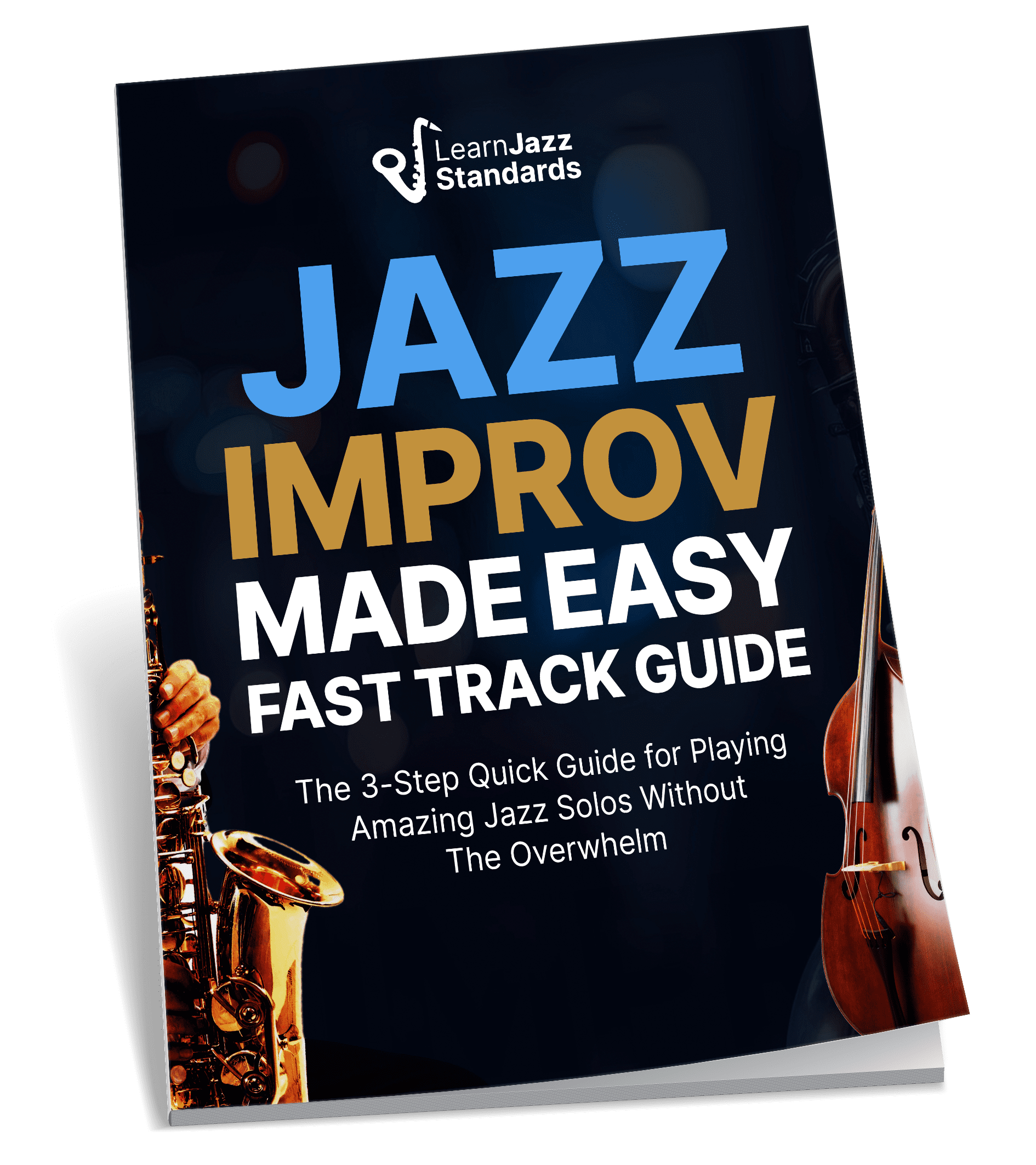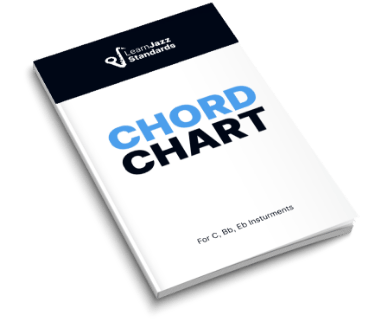Welcome to our very first episode of the LJS Podcast, where today we are talking about 4 Habits For Better Practicing. As jazz musicians, practicing is one of the most important things we can talk about. Listen in as NYC based jazz guitarist and LJS blogger Brent Vaartstra walks us through these important practicing habits.
Listen to episode 1
Hey everybody this is Brent from Learn Jazz Standards and you’re listening to the Learn Jazz Standards podcast. On our very first episode, we’re going to go ahead and give this a try… and we want to hear from you if this is the kind of content that you want to see us do more of, if you enjoy this, if listening is a little better to you than reading… then we want to hear from you. Leave us a comment in our comments section below and give us some feedback!
Enjoy listening to this podcast?
If you get value from the LJS Podcast, help us out by leaving a rating and review on iTunes or your favorite podcast service. Thanks for your help!
If you want us to do more of these podcasts, add to our comment below to give us feedback!
In this episode
- Set goals and write them down.
- Eliminate distractions.
- Practice what’s ailing you not what you are already good at.
- Be consistent.
Important Links:
LJS Inner Circle Membership
Free Guide to learn standards by ear: Learn Jazz Standards the Smart Way
So today I want to talk about a very important topic and this is 4 habits to better practicing. As a musician, practicing is the most important thing… I think we can all agree that if we’re not practicing, if we’re not striving to get better, then we just simply won’t get better. So practicing is such an important thing and one thing that I always tell my students, is as a teacher it’s more important that I teach them how to practice well, than actually give them more information. [1:08.5]
[00:01:16] Sometimes information is just information until you can actually apply it and work it and make it turn into something fruitful and useful.
[00:01:27] And so that’s why I think talking about practicing is incredibly important.
[00:01:31] And by the way a lot of these points that I’m making today you can also find in our free e-book a Jazz Guide to Practicing. You can sign up to get that eBook by subscribing to our newsletter. Go to www.learnjazzstandards.com/newsletter or you’ll see in the right hand column an opt in form to sign up for our newsletter there. So without further ado, let’s go ahead and talk about the four habits to better practicing.
[00:02:11] Number one. This is a very important one. Set goals and write them down. Now it’s no secret there have been lots of studies done about the success rate of those that that not only set goals for themselves but write them down. They tend to be much more successful than those that A.) don’t set goals at all and then B.) don’t write them down. Now why is setting goals so important for a jazz musician. As jazz musicians were expected to do so much: we’re expected to play at a very high level, have a great understanding of music theory, play it a virtuosic level.
[00:03:02] And so, it’s important for us to start with this very first step and if there’s one thing I want you to take from this podcast today… is this first habit: write goals… set goals and write them down. This is the most important thing you can do and I can’t stress this enough.
[00:03:23] The first thing you need to do when you’re going to, you know, start setting goals for yourself, is ask yourself, “What is it that I want to get out of this? What do I want to get out of jazz? Am I trying to become a professional jazz musician? Is this a hobby that I just I just want to become a great player? I want to keep working and, you know, become the best jazz musician I could possibly be?” Does jazz bring you a lot of joy or is it perhaps something that you’re wanting to try to you know make a career out of?
[00:03:55] And so these are the kinds of things you have to ask yourself and you can even ask yourself, you know, simpler questions, like, “How good do I want to get?” That might seem like a funny question, but you have to ask yourself how passionate are you about becoming a great jazz musician. Because one thing you need to know is it’s not easy to become a great jazz musician. I can I can tell you from personal experience it takes a lot of dedication, it takes a lot of effort.
[00:04:27] So the first question you want to ask yourself is, “What do I want to get out of this?” That will start influencing your goals. And when I’m talking about setting goals for yourself, I like to talk about two different kinds of goals. First, we have long-term goals and second we have short term goals. So, let me talk quickly about long term goals. After you’ve asked yourself that question you know what is it that I want to get out of this thing called Jazz.
[00:04:57] Then you can start saying to yourself, “Well, where do I want to be in one year? Two years? Maybe three, four, five years?”
[00:05:09] It could be different for everybody. For a student, it might be, “I want to get into a great jazz college.” And so then, you’re already setting a pretty broad goal. Or it could be a little more specific. It could be, “Well I want to learn how to play 30 tunes, 30 new jazz standards by the end of this year.” Or it could be to learn how to play these 10 solos over the course of a year or two, or however long that would take you!
[00:05:40] And so it’s these kinds of long-term goals that you want to start thinking about. Then, after that, you want to think about short-term goals. Short-term goals can be explained as, “How do I get to my long-term goals,” right? You know, short-term goals are more like, “What do I want to get done this month? What in my practicing do I need to get done this month or week?” You know, to end up reaching these long-term goals. Let’s go to that example of the long-term goal of ‘learning 30 jazz standards in a year,’ let’s say that’s the goal. Well, then you have to ask yourself, “How do I get there?”
[00:06:24] Maybe you want to learn a new jazz standard per week or every two weeks. Which jazz standards are they that you want to learn? Write them down!
[00:06:38] Maybe you want to learn how to play a solo by one of the greats, like a Charlie Parker solo by the end of the month. Well, then figure it out. How many bars do I need to learn every single week? OK? How many bars do I have to learn on my instrument every week in order to attain that goal?
[00:06:57] And so those are short-term goals. So, in the end, your long-term goals are influenced by your aspirations. Right? Those questions that I had you ask at the beginning, “What do I want to get out of this thing?” And then, your short-term goals are inspired and influenced by your long-term goals. “How are you going to get there?”
[00:07:20] So, set goals and write them down. Write them down in a place where you’re going to see them: on your wall where you practice, in your bedroom… I don’t know where it might be for you, but write it in a place where you can say, “This is where I want to get to in my jazz playing. This is where I want to reach for.”
[00:07:41] Shoot for the stars. You know, I’m a dreamer,personally. Shoot for for greatness, because if you do at least shoot for greatness, you’re going to at least fall somewhere below there. But, if you shoot too low, you know, you might end up not getting near as far as your true potential. So if there’s one of these habits that I want to really drive home today, it’s set goals and write them down.
[00:08:24] Number two: remove distractions. When you’re going into your practice session… I know this has happened to me. You know, you go into practice and all of a sudden you find yourself on your laptop checking Facebook or you get a text message and you start responding to that text message or you get a phone call from a friend or family member and before you know it, you’re completely distracted, you’re completely off, you can’t even remember what you were doing. Suddenly, your practice session is completely ruined and you didn’t get much of anything done.
[00:09:10] Staying focus is one of those things that’s just really hard for us, especially, you know, for personalities like me. I’m a guy that has a hard time staying focused. If I’m around a lot of distractions, it’s really hard for me to practice and that that becomes a serious problem for me in my playing.
[00:09:32] So how do we remove distractions from our practicing environments? Well, my first suggestion is to find an isolated place to practice. You know, too often, we’re just practicing in a place where there are a lot of things going on. It may be our home or home office where we do other activities. The ideal situation would be that you have a practice room that’s separate from your house, where you live. And I know that’s just not possible for most people.
[00:10:13] So, I would just suggest finding a place that is dedicated and almost like a sacred space where this is where you practice and you do little else other than that.
[00:10:26] You know, when I was in college, my first year of college, I went to a great art school, Cornish College of the Arts in Seattle, Washington, before I moved on to New York City. I got my jazz performance degree at City College of New York. But, at Cornish College of the Arts in Seattle, there is this room on the very top of the building. And it was the founder of the school’s old building from the early 1900s, Nellie Cornish. So it was a very interesting room. I mean, old building, the wood creaked in the middle of the night, you know, there’s this nice orange light in the side of this room and there was this grand piano sitting in the room and just a chair. And I would go up there, you know, late at night and just sit there and practice. It was quiet, there was nothing else to do other than practice. There were big French doors at the back that looked out onto downtown Seattle and you could see the Space Needle… it was just a very serene place to practice. There were no distractions around. And some of my best practicing sessions came from that, from just being in a place where I wasn’t going to be bothered. It was quiet. That room was where I practiced, there wasn’t another reason to be in that room and that was so helpful for me. So find a place, where you can practice, that is isolated and sacred for your practicing space. [1:53.9]
[00:12:20] And the other one is obvious: eliminate distractions. Don’t bring something to your practice session that you won’t actually need for practicing. Turn your phone off & don’t bring your laptop. These are the things that commonly in this modern age distract us. You know, if you need an MP3 player to transcribe a solo or to try to learn a tune, that’s that’s another thing altogether. But, you know, start disciplining yourself not to bring items that you won’t need other than your instrument, yourself and a necessary tool like like an iPod or something like that. Start this habit today of removing distractions from your practice room and I guarantee you that you will begin to have more fruitful practice sessions and you’ll watch your playing get better and better every single day.
[00:13:27] Habit number three, is one that we are all guilty of from time to time, sometimes more often than less, unfortunately. Practice what is ailing you, not what you’re already good at practice.
[00:13:47] It’s so easy, it’s so comfortable to practice things that you already know you’re good at. You know, you practice this one tune that you know, “Oh, I can really tear lines over this thing. Oh man I sound so good on this.” You know, that’s comfortable. That feels safe and we like that, because so often as musicians we have this psychological thing going on our head where we want to prove to ourselves that we’re good enough. You know, we want to feel like we really can play this, we can really do this. “That’s right, Now I know, I remember, I’m actually good,” you know?
[00:14:28] But that’s a place, that anybody that wants to progress at anything, does not want to be in. What we want to be doing is identifying what parts of our playing need help and what we can do to get that out of the rut that it’s in right now. So, let’s say you have issues playing jazz language, you’re not able to play chord changes that well. Well, don’t just settle for playing your minor pentatonic scale or something that you already know. Go out there and say, “I’m going to find a way to make this better. I’m going to start transcribing solos, start learning solos, I’m gonna start taking licks through all 12 keys,” so start attacking that. Maybe you’re not good at playing fast tempos and it feels comfortable for you to always practice at a medium tempo, a comfortable tempo. Then, go ahead and start attacking those fast tempos. [1:03.2]
[00:15:31] Don’t be afraid to fall on your face, because that’s what this whole practicing jazz thing is. It’s crashing. Over and over again and then picking yourself back up and being better for it. I’ve played many a gig where I left going, “oh man, that was a train wreck. I completely messed up that song, oh I lost the form, oh I couldn’t play that fast. All the changes to that song were so difficult.
[00:15:59] But then after that, I went home and I practiced. I said, “you know what I’m not going to let that on me anymore.” So, we need to start developing the habit of sitting in the practice room and saying, “I’m going to focus on the things that I’m not good at, instead of the things I’m great at.” Remember: the practice room is like a laboratory. OK? It’s the opportunity we get to slow things down, to you know break it up into pieces, to really analyze it. You’re not necessarily supposed to be sounding good. You know, you’ve probably actually heard it before said, that if you’re sounding really good while you’re practicing, well, it probably means you’re not actually practicing. And there is a level of truth to that.
[00:16:48] And this is not to say that in your practice sessions, you shouldn’t have a time where you just, you know, play and have fun. That’s something good to put maybe, at the beginning of your practice session: give yourself a good 10 minutes at the beginning to just play things that you’re comfortable with and then move on from there, though, don’t let that linger for too long. So, our second habit that we really want to start working on today, is practice what’s ailing you, not what you’re already good at.
[00:17:34] The third habit is be consistent. Be consistent with your practicing. This is obviously something that everybody struggles with, if not because sometimes there’s a lack of motivation, but because our lives are so busy. You know, most people listening to this podcast are not professional musicians. You’re out working a job or you’re retired or you have to do this and do that and family and, I mean, the list goes on and on. We all live busy lives, sometimes we don’t have time to practice.
[00:18:14] And that’s OK. But what we need to start doing today if we really want to get better at playing jazz, if we really want to see some real change, some improvement in our playing, is we have to get more consistent about it. And that starts by simply evaluating your life schedule and making a plan.
[00:18:35] “When am I going to practice this week? Where am I going to set aside the time to make this a priority?” And, you know, a common mistake a lot of people make is they think, “I have to practice for a really long time. An hour or two or three in order to make some real progress in a practice session.” And that’s just simply not true. In fact, it’s way more valuable if you’re only able to spend 30 minutes or 20 minutes and do that every day rather than just have one day where you practice for five hours or three hours. It’s much more beneficial for you to stay consistent and especially so if you’re applying our habit number three (practicing what you’re not good at). You can have a really productive practice session in just a short period of time. That’s a common misconception, that you need to practice for hours and hours and hours and hours… you just don’t. [1:03.3]
[00:19:38] When I was in college, I did have some crazy practice sessions sometimes. I think the longest one I ever did was 10 hours long, which is RIDICULOUS, let’s be honest, that’s ridiculous. I’m not saying that I regret doing it. I did at one point in my life, used to practice five or six hours a day, and I don’t regret any of that. But, I will say that I’ve had practice sessions that lasted 30 minutes or even an hour, where I got way more out of that practice session than I did that crazy 10 hour practice session. So, there’s always time that you can fit in a good practice session. But the most important thing, is that you’re staying consistent with it. That you’re consistently practicing X amount of times a week.
[00:20:31] I’m also a runner, I like to go running. And I find that if I’m not running consistently, I’m really tired when I go and run, and that’s the same with music. If you’re not staying consistent, you’re going to feel out of shape, you’re not going to feel ready to go. You’re not going to stay focused and remembering what you did and building on the progress that you made before. So, make sure that you make a plan. Look at your schedule and ask yourself, “When can I find some time to practice this week”?
[00:21:16] So that wraps it up here for today’s podcast, Four Habits to Better Practicing. We want to hear from you: if you enjoyed listening to this podcast, please leave us a comment below. We want to hear your opinion, your thoughts, and know if we should continue doing this in the future. Also, don’t forget to subscribe to our newsletter if you want to get involved in our community and know what’s going on with Learn Jazz Standards. That’s the best place to do so. [1:09.4]








